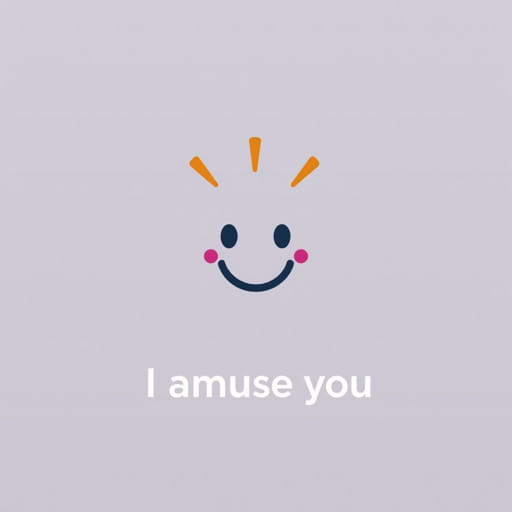When someone says I amuse you, the phrase can carry a variety of meanings depending on tone, context, and intent. It might sound lighthearted, humorous, sarcastic, or even confrontational. The verb ‘amuse’ generally refers to the act of entertaining someone or causing laughter or interest. However, this phrase has grown to carry more than just a dictionary definition it is often layered with nuance, emotion, and social cues. Understanding what I amuse you really means can deepen your grasp of English communication, especially in informal or conversational contexts.
Literal Meaning of ‘I Amuse You’
Literally, ‘I amuse you’ means ‘I entertain you’ or ‘I make you laugh or feel entertained.’ The subject ‘I’ is the one providing amusement, and ‘you’ is the one receiving it. It’s a direct sentence that uses the verb ‘amuse’ in the simple present tense.
Examples of literal use:
- I’m glad I amuse you with my jokes.
- Do I amuse you? I didn’t know I was so funny.
- I amuse you when I try to dance, don’t I?
In such examples, the phrase is often said with a smile or a chuckle, meant to acknowledge that the speaker’s actions are perceived as funny or entertaining.
Connotation and Cultural Influence
One of the most famous uses of the phrase I amuse you? comes from the filmGoodfellas(1990), in which the character Tommy DeVito, played by Joe Pesci, delivers the line: Funny how? I mean, funny like I’m a clown? I amuse you? This scene has deeply impacted how the phrase is perceived in pop culture. In that moment, the phrase is used sarcastically and aggressively, flipping the friendly idea of amusement into something confrontational and threatening.
Influence of Tone
The meaning of I amuse you depends heavily on the tone used:
- Playful: A person might say it jokingly if they know they’re being funny or silly.
- Sarcastic: If someone feels mocked or not taken seriously, they might say it with irritation.
- Genuine: In some cases, it’s a sincere observation, perhaps by a performer or friend who’s glad to see you laugh.
Grammatical Structure
The phrase I amuse you is structured in a straightforward subject-verb-object (SVO) format:
- I the subject doing the action
- amuse the verb expressing the action
- you the object receiving the action
It’s in the present simple tense, used to describe general truths, habitual actions, or current states. The verb amuse is a regular verb and can be conjugated easily: amuse, amused, amusing, etc.
Other Forms and Synonyms
If you’re exploring similar ways to express amusement or entertainment, consider these alternatives:
- I entertain you.
- I make you laugh.
- I cheer you up.
- I delight you.
Each of these expressions carries a slightly different emotional tone but is related to the idea of making someone feel happy or interested.
Common Variations
You might encounter these variations in everyday speech:
- You think I’m funny?
- Is that amusing to you?
- Glad I could entertain you.
- Oh, I’m your personal comedian now?
These variations, depending on voice and setting, can sound either humorous or passive-aggressive.
Contextual Usage in Conversation
Let’s explore how I amuse you can appear in different situations to help clarify its meaning further.
Casual Conversation
Person A: You’re always doing something silly!
Person B: Oh really? I amuse you, huh?
Here, Person B is likely joking and enjoying the light-hearted moment.
Defensive or Confrontational
Person A: (laughs unexpectedly at something)
Person B: Wait, do I amuse you? What’s so funny?
In this case, Person B might feel offended or misunderstood, and the phrase takes a more serious turn.
Performance or Entertainment Setting
Performer: If I amuse you tonight, don’t forget to tip your server!
Used here, the phrase is direct and sincere, acknowledging the role of entertainment.
Psychological and Emotional Insight
Often, the phrase I amuse you can reveal more about a person’s emotional state than you might expect. If someone says it defensively, it might show they feel disrespected. When said happily, it shows a bond or connection through laughter. Understanding the context and emotional undertone helps avoid miscommunication.
Self-Perception
People who use this phrase may be evaluating their role in a relationship or situation. Are they the comic relief? Are they not being taken seriously? It becomes a window into how they believe others perceive them.
Relationship Dynamics
The phrase can also point to power dynamics in conversation. A speaker might use it to assert themselves or demand clarity. For example, if someone feels mocked, saying I amuse you? is a way of reclaiming control in that moment.
In Humor and Entertainment
Amusement is essential in human connection, and expressing that you amuse someone can be a compliment when sincere. Comedians, writers, actors, and public speakers all aim to amuse their audiences. In this context, I amuse you becomes a sign of success.
Example in Media
In stand-up comedy, a performer might playfully interact with the audience using the phrase:
I amuse you? Good, because that’s my job!
This light use shows that amusement is a desired outcome in performance settings and can bring people together through shared laughter.
Understanding the phrase I amuse you goes beyond grammar. It involves tone, context, emotion, and cultural influence. Whether used sincerely, sarcastically, or confrontationally, the phrase reflects human relationships, communication, and the fine line between humor and disrespect. Paying attention to how and when it’s said helps avoid misunderstanding and deepens your appreciation of conversational English. Ultimately, the meaning of I amuse you depends less on the words themselves and more on how they are delivered and received.
